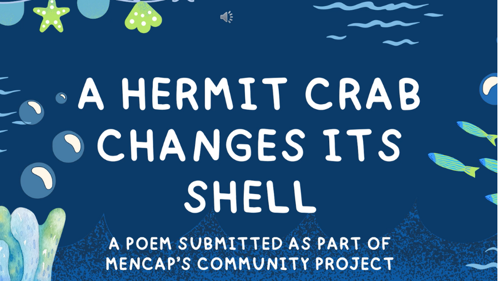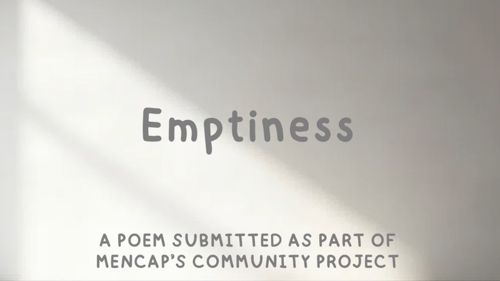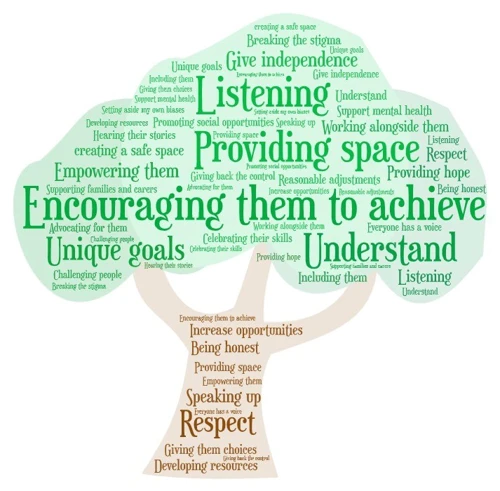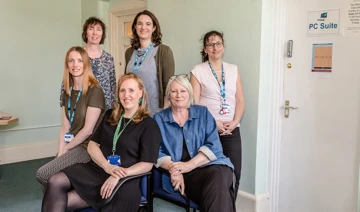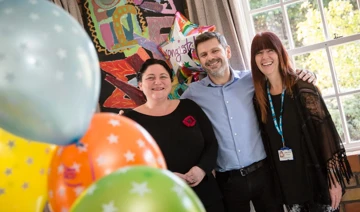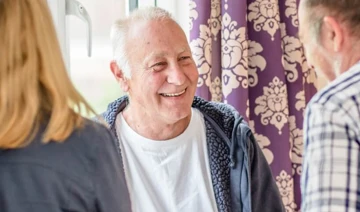- PDF documents
- News and events
- KMPT Newsletters
- Mental Health of Learning Disabilities Newsletters - Let me tell you about my ability...
Mental Health of Learning Disabilities Newsletters - Let me tell you about my ability...
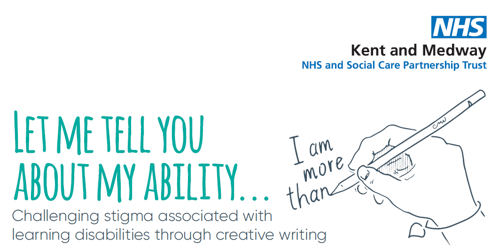
Welcome to Let me tell you about my ability...
This community psychology project was created by the Mental Health of Learning Disability team (MHLD) as a way to celebrate people with a learning disability. Our hope was to offer a platform for individuals who have a learning disability to share their wisdom and achievements as well as the challenges and barriers that society can place on their path.
In our last edition (June 2024) we shared a Forest of Professionals and Supporters that someone with a learning disability may meet along their journey.
In this edition of “Let me tell you about my ability” we have revisited the theme of creative writing from a previous edition in June 2021.
Creative writing can be a therapeutic tool to explore deeper thoughts, emotions and meaning, that may be difficult to bring to the surface otherwise. It is a form of self-expression that can be utilised in therapy to communicate experiences, process feelings, and empower an individual. Creative writing can help with feelings of stress, sadness, worry or confusion. It can also help with confidence, problem-solving skills, and awareness of yourself and others.
In this edition we have two poems in the form of animations to showcase. These poems were written by an individual whilst they were in therapy with MHLD. They gave permission for us to share their words as part of our commitment to giving a platform for people with learning disabilities, and challenging preconceptions that exist around people with learning disabilities.
We hope you enjoy reading our latest edition.
Poem 1: A hermit crab changes its shell
Poem 2: Emptiness
We hope you enjoy the poems, and that they maybe even inspire you to write something yourself!
Below are some ideas to get you started;
- Write about your favourite place. This may be your bed, sofa, a town/city, or a scenic park or beach. What does it look like, smell like, sound like, feel like?
- Write about what it would be like to have a superpower of your choice. What would you do? Where would you go? How would it change your life?
- Write about your perfect day. What would you be doing? Where would you go? Who would be with you? How would it make you feel? Have you had a day like this before?
This edition was co-created by:
- Jerri Callis (Trainee Clinical Psychologist)
- Milly Salisbury (Trainee Clinical Psychologist)
- Carmel Digman (Former MHLD Clinical Psychologist)
- Georgia Crockford (Clinical Psychologist)
If you have lived experience of a learning disability or are caring for a person with a learning disability and would like to submit a poem or piece of artwork for a future publication, please contact us at kmpt.mhld.communitypsychologyproject@nhs.net
|
|
We are thrilled to be able to share with you a very special second issue of Let me tell you about my Ability. This issue has been written, edited, photographed, and coordinated in its entirety by women as a heartfelt tribute to women with learning disability (LD) on International Women’s Day.
Even to this day many women with LD continue to experience direct and indirect victimisation, disadvantage, abuse and discrimination. Tragically, history tells a dark and profoundly shameful story at the hand of the infamous Eugenics movement. Over two decades (1920s –1940s) hundreds of thousands of women with LD were robbed of their right to motherhood through forced sterilisation. Even today women with LD continue to fight hard for their rightful roles as gendered women and mothers.
In my nearly two decades of clinical practice I have had the great privilege of meeting many inspiring women who happen to have LD. Listening to their harrowing stories I am repeatedly left with an all-consuming oppressive feeling of sadness and indignation at the sheer injustice and disregard that these courageous women have been subjected for such a long time. Society (which we all make up together) has got it wrong so many times, often failing to recognise and treasure the unique gifts and wisdom women with LD give back and contribute to society.
Over the years I have been struck by the infinite resilience of women with LD and even in times of adversity they often find a way to offer boundless compassion towards others. I have witnessed these incredible women fighting with all their might in pursuit of the right to live their lives according to their values. All of these with an admirable gift for sincerity and the spontaneity to laugh with open abandon, to be truly present and to soak in, and generously share every last drop of joyfulness that comes their way. I feel so fortunate and deeply grateful to do the job I do.
This second edition of Let me tell you about my Ability is a celebration of the attributes that women with LD possess in abundance: bravery, tenacity, generosity, and resilience amongst many others. A chance to highlight and reflect on the rights of women with LD and the gifts of wisdom they offer to those who are lucky enough to have them in their lives.
We are immensely grateful and honoured to have collaborated with two separate projects to produce this issue. A beautiful project by East Kent Mencap - Lucy Edematie (writer), Sarah Wyld (photographer), and Rachel Connelly from POW! Thanet, who coordinated the project to celebrate women with LD on Women’s Day 2021, which unfortunately could not take place due to the pandemic. We are humbled to offer East Kent Mencap and the inspirational women in their project a deserving platform to celebrate women with LD all over the world.
We are also hugely appreciative to Iiris Kleinberg and Kate Theodore, and the inspirational mothers with LD who co-produced The true story of mothers with LD: We CAN do it! for letting us include one of the many moving testimonials and poems from their publication.
Happy International Women’s Day, and thank you for reading,
Aggie Moreno-Lopez









Judgement Day
Past
Growing up was hard,
Especially living with my disability,
People judging me, calling me names,
I wanted to fight back and protest and say ‘Hey I am
here, I am human, just like you, you think I’m scared
but I’m not, I’m probably stronger than you’,
p.s. I wasn’t born like this, my life changed when I
was 2.
Now
Don’t judge, just ask,
I’m not a monster, I don’t bite,
I’m funny, I’m beautiful,
I have responsibilities,
I am a mum! And I just love to have fun.
Look in the mirror, everyone is different,
The world would be boring if we were all the same,
I can write, I can cook, I can sing, I can make things,
I can give birth,
My children all have their own minds and just like
their mum they love to have fun!
Future
I will love myself more,
I will talk to people about how I feel,
I will write more poems and songs,
I will continue to find happiness and peace,
I will help my children through their ups and downs,
They will follow my example.
Written by L
Acknowledgements
This project is coordinated by Aggie Moreno-Lopez, Alexis Ng, and Georgia Roach.
If you have lived experience of a learning disability and would like to submit a poem or piece of artwork for a future publication, please contact us at kmpt.mhld.communitypsychologyproject@nhs.net
Approximately 1.5 million people in the UK have a learning disability and this figure is increasing.
However, many people without learning disabilities (LD) do not know what a LD is, or how it impacts the lives of people who are considered to have one. The aim of this project is to amplify the voices of adults with LD offering a platform to share their valuable insights and experiences and raise awareness and tackle misconceptions.
A learning disability affects the way that people learn new things, understand information and communicate but there is no “singular” profile of learning disability – each person has their own strengths and challenges.
For many people there is no known cause for their learning disability but there are some better-known conditions that may feature learning disability e.g. Down’s syndrome and Turner’s syndrome.
Some people with LD may also have an Autism Spectrum Condition (ASC) or epilepsy, but not all.
We are using creative writing and artwork by those with lived experience of LD as a vehicle to fight stigma and offer their valuable insights. We will be sharing with you the benefits that creative writing can have and most importantly inspiring pieces created by adults with lived experience of LD.
The benefits of creative writing
Poetry and literature has been demonstrated to have many therapeutic benefits and can help in the treatment and management of many psychological conditions, such as anxiety, depression, Post- Traumatic Stress Disorder (PTSD), bipolar disorder and eating disorders. It can even help to combat day-to-day stress.
Writing poetry allows us to:
- Express our thoughts and feelings
- Gain insight into our emotions
- Deal with stress
- Consider other perspectives
- Problem solve
Writing also has a number of personal benefits, including:
- Increased self-esteem and confidence
- Improved self-awareness
- Emotional regulation
- Empowerment
In addition to the impact on individuals, poetry and creative writing can provide a vehicle to challenge stigma and misconceptions.
To find out more about the project, please email: kmpt.mhld.communitypsychologyproject@nhs.net
Did you know?
I’ve got Down’s syndrome but did you know…
I go ski race training boot camp once a month, I have two ski coaches and train for the special Olympics.
I have Down’s Syndrome but did you know…
That while some children watched cartoons, I would watch countdown on TV and learn how to write numbers and letters.
I’ve got Down’s syndrome but did you know…
I learnt a Shakespeare monologue from Romeo and Juliet in roughly one week. I’m still waiting for my Romeo…
Yes, I’ve got Down’s Syndrome but did you know…
I make a bloomin’ good Chilli Con Carne; it’s the cleaning up afterwards… I’ll do it but I don’t love it.
I’ve got Down’s Syndrome but did you know...
I started to walk at 18 months and learnt to read at the age of 4.
And yes I’ve got Down’s Syndrome but did you know…
I’ll often get up early on a Sunday and go for a 15 mile bike ride with my Mum and Dad.
Yes I have Down’s Syndrome but did you know…
That I like a challenge.
Written by Alison
This is me
Stood silent at the door clutching a hand,
This wasn’t the shopping experience I had planned.
I can feel people staring at me all the time,
It’s not very nice, it’s out of line
Little children looking up at me
Unable to understand my disability.
Just give me a smile or a wave
This can help me feel so brave.
All it can take is a smiley face
To change the world to a happier place.
Written by Victoria
The animal does not judge
Animals don’t judge my Autism, they don’t judge my epilepsy. You can feel safe and secure around an animal.
The dolphin swimming in the sea, makes me smile
The way a butterfly lands on your head, makes me feel relaxed.
The sound of a woodpecker in the park, it goes tap tap tap.
Animals make you feel like you can achieve anything. You can be yourself around an animal.
I like animals, they’re good. I’m happy with animals.
As long as it’s not a snake.
Written by NIkki
I may not have words
I may not have words, but I feel
I may not have words but I know when you are hurting
When you need a hug, a smile or a hand slipped into yours
I may not have words, but I feel the cold stare that lingers too long
That probes and questions my differentness
I may not have words but I feel the intensity of separateness- of sadness
I may not have words but I have love
And can teach you to radiate that warmth unconditionally and without limit
I may not have words
Written by Greer
If I had that magic wand, if I had that genie and three wishes, a chance to change perceptions...my magic wand moment would be…
For people to stop and think, for people to be shown the way and to be educated.
To look past what things look like on the outside and see the beautiful and good things on the inside.
Where all abilities unite as one.
For people to not be scared to help someone with a disability.
To help young people to understand and to learn so they can educate their parents.
For people to be patient.
For kindness to people with disabilities to be a habit they just can’t shake.
One magic wand moment… I’d wish for a car
Written by Ian, Nikki, Victoria, Steven and Becky
Paintings





All images by Ann
Information sheets
Take a look at our project information sheet
Take a look at our participant information sheet
Take a look ar our easy read participant information sheet
Acknowledgements
Our thanks to all of the authors and artists who contributed to this publication and to Scotts Project for their support in facilitating creative writing workshops with some of the contributors.
If you have lived experience of a learning disability and would like to submit a poem or piece of artwork for a future publication, please contact us at kmpt.mhld.communitypsychologyproject@nhs.net
June 2023
Welcome to Let me tell you about my ability...
In this special edition of Let me tell you about my ability, we are sharing stories as told by family members and carers of people with learning disability¹, who are autistic² and have additional mental health needs.
This introduction comes from Iiris Kleinberg, a Senior Clinical Psychologist in our Mental Health of Learning Disability Service.
As professionals working in the Mental Health of Learning Disability Service, we often support our clients by working indirectly with their loved ones. Parents and siblings give our clients a voice and reduce barriers to understanding and communication. Sadly, family carers can feel silenced by services and organisations. Carers can feel like their skills and knowledges are not listened to or that their skills may be considered to be less important than those of professionals. This is something we try to keep at the forefront of our minds when working with families to ensure we do not contribute to further silencing.
I feel grateful about being able to work with parents and siblings as they continue to teach me so much personally and professionally. This is why I want to take this opportunity to share their experiences, knowledges and advice that I have had the privilege of capturing during Psychology appointments. The carers themselves are hoping that by sharing their stories, they will be able to make a difference to the understanding of others. They are hoping that this in turn may change the experiences of other families who may feel better listened to and understood as a result.
Later in this newsletter you can read a piece from Maggie and Maria, Matty’s sisters, who wanted to share the story about Matty’s life that has not been documented in clinical notes up until now.
Thank you, Maggie and Maria, for sharing both the very painful and beautiful moments of Matty’s life.
Thank you for reminding us that there are always two sides to every story! At the end of Matty’s story, Maggie and Maria also share in their own words, advice to services and organisations for interacting with people with learning disability and their families.
You can also read about Cheryl, who shares Mother’s Knowledges of parenting children with additional needs. Cheryl hopes she can help other parents on their journey by sharing her learning over the years as well as her advice to services and organisations working with people with learning disability.
I hope you enjoy reading these stories. If you would like to respond to Maggie and Maria or Cheryl, you can e-mail us on: kmpt.mhld.communitypsychologyproject@nhs.net
We can then forward your messages on. They would love to hear what you connected with and what difference their stories made to your life and work.
You may find it useful to think about the questions below when responding to Maggie, Maria and Cheryl.
- What words/phrases stood out for you as you read these stories?
- Did an image come to your mind?
- What is it about your own life/experiences/work that means you connected with these words/phrases?
- What ideas/hopes has reading these stories given you? Were you reminded of something that is important in your own life?
Best wishes,
Iiris
Guide to professionals of Matty. There are two sides to every story!
Matty has physical and mental disabilities but, like the rest of us, is also living day-to-day. He is enjoying his life and contributes to his family and society. Matty has a good sense of humour.
His disabilities never affected my (Maggie’s) growing. It was other people’s lack of understanding and lack of opportunities for Matty that were difficult. It wasn’t my brother but the questions I got asked that were embarrassing, like: “What’s wrong with your brother?” I said: “There’s nothing wrong with him. He just can’t walk and talk like us.”
Matty has taught others about disability and difference. He has taught us to appreciate the little things like smelling the trees when we go out for a walk.
My brother has shown me (Maggie) things that really can’t be put into words, or explain my love for him. It’s a very powerful thing. People who I have worked and socialised with over the years, always ask after him. Some have never met him, but feel they know him because I talk about him so much. I am very, very proud of my big brother, and am very grateful to him. I love him unconditionally, and will assist in enabling him to live a happy and fulfilled life.
When we were young, my Mum provided the love and care. Dad is the root to Matty being able to spell his name. Dad taught Matty his letters and numbers. Dad was patient and showed him. He did the dots for him and Matty would join the dots round to spell his name. He sat at the table with his hand over Matty’s hand and said: “Around and a down, around and a down”. This became a mantra for us all. Dad said: “You’re gonna learn like everybody else.” Matty was potty trained and taught to use a knife and a fork. Dad pushed him. He made Matty parallel bars from scaffold poles to help him to move along. If we went somewhere, Matty would come with us. We have called Matty Myrtle the Turtle since he was a child. He was always so slow.
Matty understands what you say. He understands more than he is able to share. If he was born now, he would have been able to learn much more with access to speech and language therapy as a child.
Matty fed his nephews and nieces. He used to hold them and cradle them until they fell asleep. He showed patience and kindness. He is very fond of babies. He projects calmness, gentleness, patience, kindness and care. He plays with them. He takes pretend food and cups of tea from the desk and hands it back to his niece.
Matty’s challenging behaviour comes from the sheer frustration from the physical experience of his body. He has never had a decent enough wheelchair to be able to feel comfortable.
Matty brings out laughter and compassion in people. He shows love and is loved by my (Maggie’s) children and grandchildren. He will let them bounce up and down on his rigid legs when sitting in his wheelchair. He would sit and watch Peppa Pig with them but would never choose to do this with me (Maggie). He would not watch a programme he is not interested in with me but he will do this for children.
Matty has social skills and skills in being adaptable. He adjusts his way of being depending on who he is with. After he has met a person, he knows what he can and cannot say and how to be with the person. He is reading the person and is sizing them up. He will make more crude jokes with me (Maggie) than he will with his sister Maria. He chooses how to respond.
People think that looking after Matty is a struggle but mostly it’s dealing with outside agencies that’s a struggle. Having to fight with them for what Matty needed. People say, “You do realise that Matty just scribbles.” I used to say, “You do realise that Matty has Cerebral Palsy, don’t you?”
I (Maria) remember when Matty had double leg plasters from ankle to thigh with a bar in between so that his legs and hips were in one fixed position for six weeks. It was the result of an operation to cut his hamstrings to help him walk better. He was about 8 or 9 years old. The surgeons did not consider that he had Cerebral Palsy and spasms. When he had a spasm the stitches in his wounds would pull on his skin. He was not prescribed anything to relax his muscles. He slept on the sofa because it was impossible to carry him up the stairs. Mum would sleep beside him but mostly he did not sleep. I remember one night I came downstairs and saw Mum kneeling beside the sofa holding Matty’s hand as he was silently screaming in pain. My mum said something I couldn’t hear, but Matty stopped screaming for a minute and kissed her on the cheek. He was aware she too was suffering. The operation did not work.
Matty was unfortunate to be a child when patients and disabled people were expected to fit into the system and there was an almost one size fits all solution/ operation/ medication to problems. Parents and carers rarely questioned what was prescribed. Professionals rarely asked about day to day life or the needs of others, especially siblings. Things are so much better now. There is still room for improvement but, as a carer who has had nearly forty years’ experience meeting Matty’s various service givers, it has been good to be listened to and have what I say on behalf of Matty be part of his planned interventions.
Advice to services and organisations from Maria and Maggie in their own words:
- I (Maria) used to go to meetings with my mum to represent Matty. I had spoken to my mum beforehand and would talk in the meetings about what my mum wanted to talk about. But professionals thought I was railroading these meetings. Professionals can make assumptions that just because one person is speaking it’s only their view they put across when this may not be the case.
- They may just be the spokesperson for the family. Professionals could ask: “Do you represent everyone in the family or do others have a different view?”
- People make this assumption “If the doctor says, then it must be true.” It’s like “If the Priest says, it must be true.” But actually, the person has no idea why they are starting a new medication. They just say “The doctor said.” You as the professional are there to provide a service for people. They are not there for you.
- People have said there’s not much they could do for Matty. They don’t have the solutions. But when the family can verbalise a problem, they can find the solution. It’s about giving the family the space to talk.
- Listen to people’s opinions and validate them. It makes them feel better and they are able to look at something from a different angle.
- Talk directly to Matty. He is more likely to listen and respond if he is spoken to directly. He will nod and respond in his own way. Learn Matty’s signs and ways of communicating. He does not like being spoken about. Don’t talk about him in front of him.
- There’s the disability but then there’s a person. Make your presence known – touch the person if they cannot see you so they know you are there.
- Read about the person before you meet them. Address them how you would like to be addressed. Never take your attention away from them. Persistent engagement will get you something. You might get a slight nod from Matty, which you can miss if you do not pay attention. Give the person time to respond. People talking and filling in gaps can lead to frustration.
- Everybody has the right for their voice to be heard and their needs to be met. A touch, a smile can make a difference. Never be embarrassed of silence. You don’t have to fill the silence. Matty likes it. It allows him to take ownership of the conversation.
- People can have the same disability but be a totally different person.
- Siblings of people with learning disability can feel excluded. We want other siblings to know that they are important too and should have a voice. We hope that this newsletter can help others. We would like it shared as widely as possible. Hopefully it can help other siblings, parents and carers. We also hope that this document may change how services and organisations respond to people with learning disabilities.
If you want to respond to Maria and Maggie, email: kmpt.mhld.communitypsychologyproject@nhs.net
A Mother’s Knowledges
Cheryl has shared her extensive experience with us from the point of view of a mum caring for children with additional needs. Hear about her remarkable journey and the powerful lessons learnt along the way…
“I realised the way I was brought up was not going to work for my children. My mum did a good job but I realised that my children were different. You have to adapt to your children’s unique ways. I had to do things differently so it worked for my family. I decided to end the cycle."
- As a parent you need to hold back and let the child become the teacher. You can learn so much. Try not to worry about things like milestones. When you worry, you may put pressure onto your children. Different children do things differently. Just because your child may do something later than another child, it does not mean that they won’t learn. Don’t have too many expectations. Celebrate every single thing every day.
- Explore what works for you. Go by your intuition. You know what works for your child. Don’t just go by the mainstream media. Don’t let anyone control you. Every condition affects everyone differently. What works for one may not work for another.
- Talk to other people who have had similar experiences. We all learn from each other. You realise you are not alone, you can work together. You don’t feel so isolated but can build a community together. If you give yourself a voice, you can give others a voice.
- Try to have a conversation with your child to find out what they want, what’s going to work for them, what do they feel they need. Just give it a go. It’s them it’s happening to – they should have a voice.
- If it doesn’t work, you go back to the drawing board. You can look at resources, join Facebook groups to share experiences with others. Look at natural resources as well – you can ask other parents for their experiences and read up and do research yourself.
- It’s no different to when you bring up a baby – they may have colic. Or when you start to introduce food - they may have intolerances. Parenting is trial and error when it comes to children no matter how old they are. Don’t feel afraid to share with other parents or to ask questions.
- Everyone makes mistakes. It doesn’t matter if you are a parent or not. Don’t beat yourself up if you’ve got something wrong or did not try something or thought of something later on. You can still implement it. You learn something new each and every day.
- Don’t ever feel you are not good enough. Remember you are good enough. Your child loves you and needs you. You’re amazing. Don’t forget to love yourself too. Be proud of yourself, give yourself a pat on the back. Allow yourself to feel all the emotions you need to. Give yourself that you time – have a bath, take a day out with a friend or have a cup of coffee – whatever works for you.
- Life is a learning curve and it’s even more of a learning curve when you have children with special needs. There is no handbook or guidebook. You are the author of your own guidebook. You may want to keep a journal or you could write a book! Don’t hold back, put it all in, good and bad, be real and be you. That is reality, that is life. One day it may help someone else. It may save someone else’s life.
- It’s about giving children confidence to seek out what they want to do, to seek out what works for them, to seek out who they want to be regardless of what anyone else says so they can experience the world through their own eyes and their own adjustments. Remember we all see, hear and feel things differently. Be your child’s advocate and show them that they have a voice and encourage them to use it. Show them that they can and should be heard and understood, that they count and are important.
- Every single minute of every single day is an achievement that should be celebrated. It’s not just about school achievements. It doesn’t matter how a child does something, for example a child may want to lie down when getting dressed and may end up with two legs in one hole. Let them try, let them learn, it’s still an achievement. If they get frustrated, you can step in and do something. Tell them it’s ok to get frustrated. Tell them they are doing well.
- Follow your heart, follow your dreams, follow your gut and just do it.
Advice to services and organisations from Cheryl…
- People may have the same label but you need to see the uniqueness of the child and adult.
- Professionals should not tell parents what to do. Instead really listen. Really take in what the parent is saying. Take in the words that are spoken and how they are spoken. Take in the emotion.
- Ask the parent or carer what they think will work for their child/person.
- Ask the child/adult what they think will work for them.
- Remember every person is different.
- Remember the parent knows the child better than anyone else. You may have knowledge but you cannot force that onto the parent or carer. Lived experience needs to be listened to.
- One size does not fit all.
- Observe how the child / person is with the parent/carer.
- The people who give you the best tips are the people involved with the child/adult.
- Children/adults are different in different contexts.
¹A learning disability is a significant global impairment of intellectual functioning and day to day functioning with both impairments arising before
adulthood.
²The majority of the autistic community prefer to be called ‘autistic’ rather than ‘person with autism’ hence we use this description here. Autism is a
developmental disability that affects how people experience the world around them. This can include differences in the experience of the sensory world,
differences in communication, thinking, socialising and moving (Autistic Self Advocacy Network, 2022, https://autisticadvocacy.org/about-asan/about[1]autism).
Many autistic people do not have a learning disability but we work with people who are autistic and have a learning disability.
Tell us what you think…
Thank you to everyone who has contributed to let me tell you about my ability, particularly Maggie, Maria and Cheryl.
If you would like to share your comments and thoughts about the stories you have read, please email: kmpt.mhld.communitypsychologyproject@nhs.net
This project is coordinated by Iiris Kleinberg, Aggie Moreno-Lopez and Emily Laing.
If you have lived experience of a learning disability or are caring for a person with a learning disability and would like to submit a poem or piece of artwork for a future publication, please contact us at kmpt.mhld.communitypsychologyproject@nhs.net

